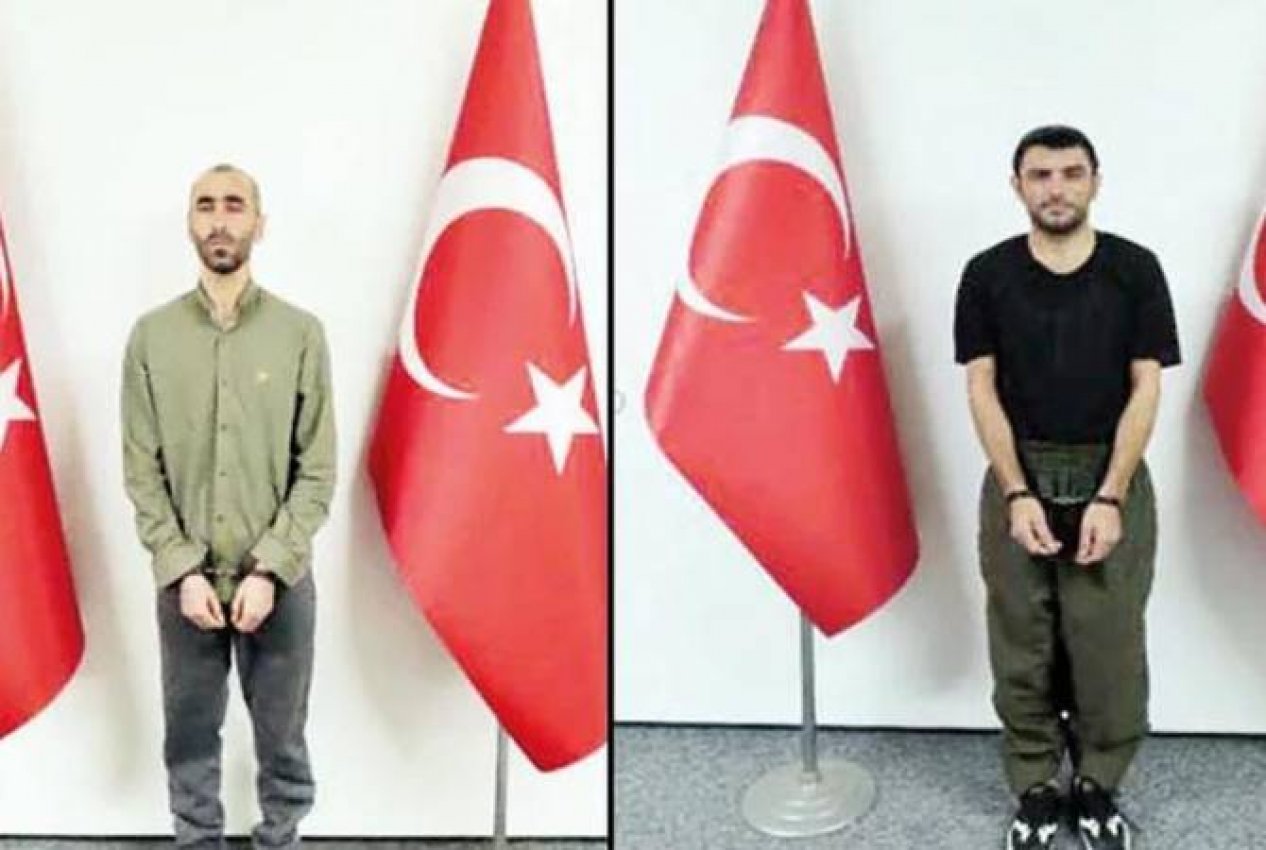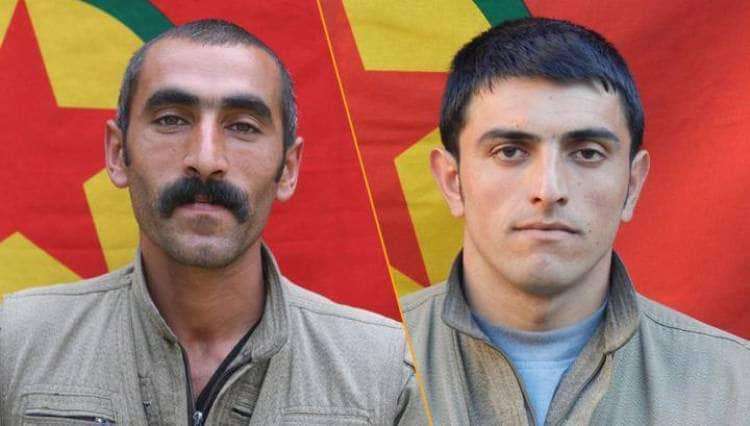
On September 25 this year, information was disseminated that Armenia handed over PKK terrorists Atilla Cicek and Huseyin Yildirim to Turkiye. After the dissemination of information, the National Security Service and the Ministry of Justice of Armenia presented an explanation stating that they did not extradite Atilla Cicek and Huseyin Yildirim to Turkiye.
The news about the extradition of terrorists from Armenia blew up the information space of this country.

Faktyoxla Lab has tried to find out why Armenia was outraged by the arrest of PKK terrorists?
First, who are Atilla Cicek and Huseyin Yildirim?
On September 23 this year, information appeared that the National Intelligence Organization of Turkiye (MIT) carried out an operation to detain two militants of the PKK terrorist organization, who were put on the international wanted list through Interpol. Atilla Cicek (callsign Lehenk) and Huseyin Yildirim (callsign Aliser) have already been delivered to Turkiye. According to the Turkish security structures, the detainees were charged with an attempt to destroy the integrity and unity of the state.
“MIT does not allow terrorists operating as part of the PKK and YPG in northern Iraq and Syria to raise their heads. Atilla Cicek and Huseyin Yildirim, who were recently put on the international wanted list by Interpol with a red bulletin, were accused by the Tunceli and Agri prosecutor’s office of terrorism, organizing armed attacks and violating the unity and integrity of the state, arrested and taken to Turkiye,” Turkish media reported. The same news, which is believed to have reached the Turkish media from MIT, also stated that the captured PKK terrorists are preparing for "a new armed attack on the security forces on the border line." Based on the intelligence information received, the MIT took steps to arrest them.
“Terrorists Atilla Cicek, nicknamed Lehenk, and Huseyin Yildirim, nicknamed Aliser, were captured alive as a result of an operation carried out in the strictest secrecy. The terrorists brought to Turkiye are being interrogated,” the report says.
Terrorist Cicek was involved in the terror attack on September 25, 2012, when seven people, including six military personnel, were killed as a result of a bomb explosion in the southeastern Turkish province of Tunceli. The same terrorist was wanted for organizing a terror attack on August 25, 2020 in the Dogubayazit district of the eastern province of Agri. According to Turkish law enforcement agencies, Cicek has been operating among the leaders of the PKK terrorists in Syria and Iran for a long time, and Yildirim in Syria and Iraq.
According to Turkish media, on September 25, 2012, terrorist Huseyin Yildirim seized a car belonging to Turk Telekom in the village of Cicekli, Tunceli province, and planted a remotely controlled explosive device in it. Then the terrorist blew up this car next to the military vehicle of the Turkish army in the Ataturk region. As a result, 6 soldiers died, as well as a bystander. On August 29, 2020, the terrorist Yildirim crossed from the territory of Iran to the Agri province of Turkiye and carried out an armed attack on the security forces in the Dogubayazit region. As a result, two soldiers were killed. Another terrorist, Atilla Cicek, has been engaged in terrorist activities in Syria and Iran, bordering Turkiye, for many years.
The official MIT information does not say anything about where and by whom these terrorists were detained.
Secondly, what did these terrorists do in Armenia? On this issue, Tamara Baghdasaryan, deputy head of the Office of the Public Defender of Armenia, presented the details of the criminal case against Atilla Cicek and Huseyin Yildirim. In an interview with Armenpress, Tamara Baghdasaryan noted that Atilla Cicek and Huseyin Yildirim were arrested in August 2021 on suspicion of illegally crossing the border from Turkiye, illegally transporting weapons and ammunition, as well as smuggling weapons and ammunition to Armenia. They were charged.
“The Court of First Instance sentenced Atilla Cicek and Huseyin Yildirim to 7 years in prison, which was overturned by the Court of Appeal on the basis of an appeal by a public defender. The Court of Appeal took into account the fact that although the defendants crossed the border armed, they did not resist,” Baghdasaryan said.
On February 23, 2022, the court ruled not to apply the suspended sentence, setting a three-year probationary period. Thus, the arrest was lifted and they were released from the courtroom. “A probationary period was established for them, that is, they had to report to the relevant service at certain intervals and confirm their presence,” Baghdasaryan explained.
After that, the prosecutor’s office filed a cassation appeal, which, however, was not accepted for proceedings, and the judicial act entered into force. “They ceased to be the beneficiaries of the Office of the Public Defender after the entry into force of the judicial act. After that, we had no information about their fate,” Baghdasaryan concluded.
The National Security Service of Armenia and the Ministry of Justice also stated that they had nothing to do with this operation.
That is, two heavily armed terrorists arrive in Armenia, they are entitled to 7 years in prison, but they are released because "they did not show resistance." Would the Armenian authorities have acted in the same way towards a Turk, a Georgian or even a Russian, not to mention an Azerbaijani?
Again, these two persons crossed the border of Armenia on August 16, 2021, they were arrested and handed over to Armenian justice. In January 2022, the court of first instance sentenced them to 7 years in prison, but literally a month later, on February 23, the Armenian Court of Appeal reduced their terms to 5 years each, and they were released on parole. How did it happen that these armed people, who crossed the border of Armenia, received such a lenient sentence and, in fact, were released? After conditional release, the convicts were obliged to stay on the territory of Armenia, under the direct control of the police of Armenia. In this case, under what conditions did they cross the border of Armenia and end up on the territory of Turkiye?
That is, it turns out that these terrorists could move anywhere, especially since they have again been crossing borders illegally. Maybe they even returned to Turkish territory, where they were detained. In any case, neither the authorities of Turkiye nor Armenia say anything about the extradition of these terrorists.
Thirdly, Turkiye and Armenia have not established diplomatic relations to this day, therefore there is no agreement between the two countries on the mutual extradition of terrorists and other criminals. For many years, the Armenian special services cooperated with the PKK against Turkiye, transferred weapons and ammunition to this terrorist organization, created a training camp for PKK members on its territory, including in the occupied Azerbaijani territories. Later, one of the high-ranking members of the terrorist organization stated that during the 44-day war in the fall of 2020, members of the PKK were sent to fight on the side of the Armenians.
Fourthly, the terrorist organization Kurdistan Workers’ Party (PKK) accused Armenia of "violating its own and international laws" due to the extradition of two members of this organization to Turkiye. This is stated in a statement by the press service of the People's Defense Forces, the armed wing of the PKK. According to the Kurdish news agency ANF, in a statement, the People's Defense Forces states that members of the organization Atilla Cicek and Huseyin Yildirim were extradited from Armenia to Turkiye. The armed wing does not indicate their names, having made public the pseudonyms of the fighters - "Lehenk" and "Aliser".
This is while the editor-in-chief of the news agency Realist Sarkis Tsaturyan condemned the extradition of the "militias" of the Kurdistan Workers’ Party Atilla Cicek and Huseyin Yildirim to the "Turkish fascist regime" and talks about the "joint liberation struggle of the Armenian peasantry and the Kurdish peasantry from the Turkish colonial oppression", and which allegedly continues to this day.
In general, Armenian social networks these days are full of comments about "the glorious traditions of the joint Armenian-Kurdish struggle against Turkish fascism."
It’s just that Armenia should always remember that since 1984 the PKK has been responsible for the deaths of over 40,000 people, including women and children. The PKK is included in the list of terrorist organizations not only in Turkiye, but also in the US and the EU. The activity of the party is currently banned throughout the European Union. In recent years, the PKK has sought to shift responsibility for the bloody crimes in the region to its offshoots. In Syria, PKK terrorists cover themselves with the names PYD and YPG, and in the last two years they have called themselves the “Syrian Democratic Forces”. In Iran, the PKK operates as the Kurdistan Free Life Party (PJAK), and the Armenians better stay away from them as far as possible...




















